We pause, therefore, before we take advantage of any
apparent discrepancy or contradiction in the Bible, which may be artfully
shown, to us by unbelieving writers, and to make use of it to more easily
prove any favorite theory, which we may imbibe respecting the manner in
which America first became peopled.Assume the
ground that the human species does not come of one common head, and the
existence of the red race is a problem no longer; but believe the word of
the Holy Bible, and it will remain a mystery till God wills otherwise. In
the mean time, we can but conjecture and surmise; each person has a right to
form his own opinion. Some deduce from the writings of others, and others
from personal observation, and by making known the causes which have led to
the formation of his opinion, he will add to the general mass of information
which has been and is gradually collecting, from which eventually more
certain deductions will be arrived at.
Taking the ground that the theory respecting the origin of
the human race taught us in the Holy Scriptures is true, I will proceed to
express my humble opinion respecting the branch of the human race from which
originates that particular type of the aboriginal race of America comprised
by the term Algic or Algonquin, of which grand family the Ojibway tribe, of
whom I shall more particularly treat, forms a numerous and important
section.
During my long residence among the Ojibways, after
numberless inquiries of their old men, I have never been able to learn, by
tradition or otherwise, that they entertain the belief that all the tribes
of the red race inhabiting America have ever been, at any time since the
occupancy of this continent, one and the same people, speaking the same
language, and practicing the same beliefs and customs. The traditions of
this tribe extend no further into the past than the once concentration or
coalition under one head, of the different and now scattered tribes
belonging to the Algic stock.
We have every reason to believe that America has not been
peopled from one nation or tribe of the human family, for there are
differences amongst its inhabitants and contrarieties as marked and fully
developed as are to be found between European and Asiatic nations--wide
differences in language, beliefs, and customs.
A close study of the dissimilarities existing between the
Ojibways and Dakotas, who have more immediately come under my observation,
has led me fully to believe that they are not descended from the same people
of the Old World, nor have they ever in America formed one and the same
nation or tribe. It is true that they assimilate in color and in their
physical formation, which can be accounted for by their residence in the
same climate, and sustaining life through the same means. Many of their
customs are also alike, but these have been naturally similarized and
entailed on them by living in the same wild hunter state, and many they have
derived from one another during their short fitful terms of peace and
intercourse. Here all similitude between the two tribes ends. They cannot
differ more widely than they do in language; and the totemic system, which
is an important and leading characteristic among the Ojibways, is not known
to the Dakotas. They differ also widely in their religious beliefs, and as
far back as their oral traditions descend with any certainty, they tell of
even having been mortal enemies, waging against each other a bloody and
exterminating warfare.
Assuming the ground which has been proved both probable
and practicable by different eminent authors, that the American continent
has been populated from the eastern and northeastern shores of Asia, it is
easy to believe that not only one, but portions of different Asiatic tribes
found their way thither, which will account for the radical differences to
be found in the languages of the several stocks of the American aborigines.
Taking these grounds, the writer is disposed to entertain the belief that,
while the original ancestors of the Dakota race might have formed a tribe or
portion of a tribe of the roving sons of Tartary, whom they resemble in many
essential respects, the Algics, on the other hand, may be descended from a
portion of the ten lost tribes of Israel, whom they also resemble in many
important particulars.
Of this latter stock only can I speak with any certainty.
I am fully aware that the surmise, which is here advanced, is not new, but
is one, which has already elicited much discussion; and although later
writers have presented it as an exploded idea, yet I cannot refrain from
presenting the ideas on this subject which have gradually inducted
themselves into my mind.
Boudinot and other learned writers, having at their
command the books and observations on the Indian tribes which have been
published from time to time since their first discovery, and possessing an
intimate knowledge of Biblical history, have fallen into the same belief,
and from a mass of book information they have been enabled to offer many
able arguments to prove the Red Race of America descendants of the lost
tribes of Israel. I have never had the advantage of seeing or reading these
books, and only know of their existence from hearsay, and the casual remarks
or references of the few authors I have been enabled to consult. The belief
which I have now expressed has grown on me imperceptibly from my youth, ever
since I could first read the Bible, and compare with it the lodge stories
and legends of my Indian grandfathers, around whose lodge fires I have
passed many a winter evening, listening with parted lips and open ears to
their interesting and most forcibly told tales.
After reaching the age of maturity, I pursued my inquiries
with more system, and the more information I have obtained from them--the
more I have become acquainted with their anomalous and difficult to be
understood characters--the more insight I have gained into their religious
and secret rites and faith, the more strongly has it been impressed on my
mind that they bear a close affinity or analogy to the chosen people of God,
and they are either descendants of the lost tribes of Israel, or they have
had, in some former era, a close contact and intercourse with the Hebrews,
imbibing from them their beliefs and customs and the traditions of their
patriarchs.
To enter into a detailed account of all the numerous and
trivial causes which have induced me to entertain this idea, would take up
much space, and as the subject has been so much dwelt upon, by those who,
from having made the subject the study of their lives, and who by their
researches have gathered much of the requisite information to arrive at more
just conclusions than the humble writer, I will confine myself to stating a
few general facts, some of which may have missed the attention of my
predecessors on this road of inquiry, and which none but those intimately
acquainted with the Indians, and possessing their fullest confidence, are
able to obtain.
It is a general fact that most people who have been
discovered living in a savage and unenlightened state, and even whole
nations living in partial civilization, have been found to be
idolaters--having no just conception of a great first Cause or Creator,
invisible to human eyes, and pervading all space. With the Ojibways it is
not so; the fact of their firm belief and great veneration, in an overruling
Creator and Master of Life, has been noticed by all who have had close
intercourse with them since their earliest discovery. It is true that they
believe in a multiplicity of spirits, which pervade all nature, yet all
these are subordinate to the one Great Spirit of good.
This belief is as natural (if not more so), as the belief
of the Catholics in their interceding saints, which in some respects it
resembles, for in the same light as intercessors between him and the Great
Spirit, does the more simple Red Man regard the spirits which in his
imagination pervade all creation. The never-failing rigid fasts of first
manhood, when they seek in dreams for a guardian spirit, illustrate this
belief most forcibly.
Ke-che-mun-e-do (Great Spirit) is the name used by the
Ojibways for the being equivalent to our God. They have another term which
can hardly be surpassed by any one word in the English language, for force,
condensity, and expression, namely: Ke-zha-mune-do, which means pitying,
charitable, overruling, guardian and merciful Spirit; in fact, it expresses
all the great attributes of the God of Israel. It is derived from
Ke-zha-wand-e-se-roin, meaning charity, kindness--Ke-zha-wus-so expressing
the guardian feeling, and solicitude of a parent toward its offspring,
watching it with jealous vigilance from harm; and Shah-wa-je-gay, to take
pity, merciful, with Mun-e-do (spirit). There is nothing to equal the
veneration with which the Indian regards this unseen being. They seldom even
ever mention his name unless in their Me-da-we and other religious rites,
and in their sacrificial feasts; and then an address to him, however
trivial, is always accompanied with a sacrifice of tobacco or some other
article deemed precious by the Indian. They never use his name in vain, and
there is no word in their language expressive of a profane oath, or
equivalent to the many words used in profane swearing by their more
enlightened white brethren.
Instances are told of persons while enduring almost
superhuman fasts, obtaining a vision of him in their dreams; in such
instances the Great Spirit invariably appears to the dreamer in the shape of
a beautifully and strongly-formed man. And it is a confirmed belief amongst
them that he or she who has once been blessed with this vision, is fated to
live to a good old age and in enjoyment of ease and plenty.
All other minor or guardian spirits whom they court in
their first dream of fasting appear to them in the shape of quadrupeds,
birds, or some inanimate object in nature, as the moon, the stars, or the
imaginary thunderers; and even this dream-spirit is never mentioned without
sacrifice. The dream itself, which has appeared to the faster, guides in a
great measure his future course in life, and he never relates it without
offering a sacrificial feast to the spirit of the dream. The bones of the
animal, which he offers, are carefully gathered, unbroken, tied together,
and either hung on a tree, thrown into deep water, or carefully burnt. Their
beliefs and rites, connected with their fasts and dreams, are of great
importance to themselves, more so than has been generally understood by
writers who have treated of the Algics.
These facts are mentioned here to show an analogy with the
ancient and primitive customs of the Hebrews--their faith in dreams, their
knowledge and veneration of the unseen God, and the customs of fasting and
sacrifice. Minor customs, equally similar with the usages of the Hebrews as
we read in the Bible, might be enumerated; for instance, the never-failing
separation of the female during the first period of menstruation, their war
customs, etc. But it is not the intention of the writer to enter with
prolixity on this field of inquiry, which has been so often trod by able
writers.
The grand rite of Me-de-we-win (or, as we have learned to
term it, "Grand Medicine) and the beliefs incorporated therein, are not yet
fully understood by the whites. This important custom is still shrouded in
mystery, even to my own eyes, though I have taken much pains to inquire, and
made use of every advantage, possessed by speaking their language perfectly,
being related to them, possessing their friendship and intimate confidence,
has given me, and yet I frankly acknowledge that I stand as yet, as it were,
on the threshold of the Me-da-we lodge. I believe, however, that I have
obtained full as much and more general and true information on this matter
than any other person who has written on the subject, not excepting a great
and standard author, who, to the surprise of many who know the Ojibways
well, has boldly asserted in one of his works that he has been regularly
initiated into the mysteries of this rite, and is a member of the Me-da-we
Society. This is certainly an assertion hard to believe in the Indian
country; and when the old initiators or Indian priests are told of it, they
shake their heads in incredulity that a white man should ever have been
allowed in truth to become a member of their Me-da-we lodge.
An entrance into the lodge itself, while the ceremonies
are being enacted, has sometimes been granted through courtesy; but this
does not initiate a person into the mysteries of the creed, nor does it make
him a member of the society.
continue chapter 3
1
- 2
- 3
- 4
- 5
- 6
- 7
- 8
- 9
- 10
11
- 12
- 13
- 14
- 15
- 16
- 17
- 18
- 19
- 20
21
- 22
- 23
- 24
- 25 - 26 - 27 - 28 - 29 - 30
White Eagle Soaring: Dream Dancer of the 7th Fire
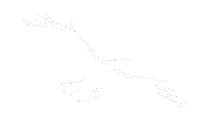
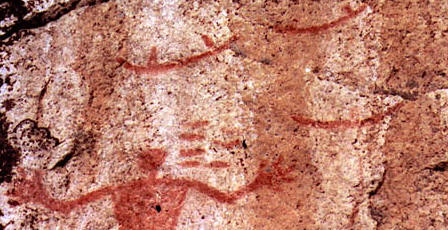
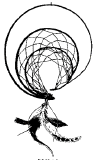
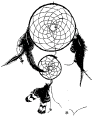
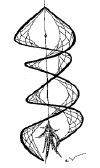


 Get
a course to promote your business online, explode your sales
Get
a course to promote your business online, explode your sales Get
software to promote your business online in less time
Get
software to promote your business online in less time Get
software to streamline your business and run it hands free.
Get
software to streamline your business and run it hands free.